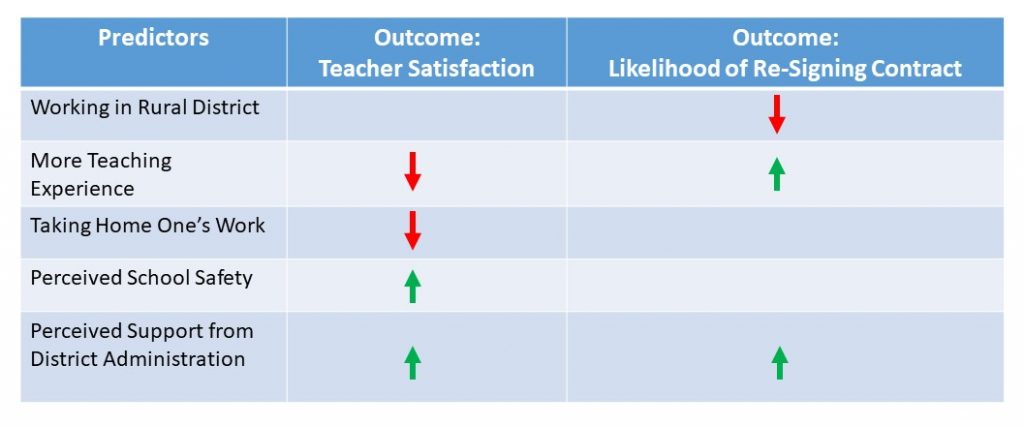12 Nov Predicting Teacher Retention & Satisfaction: A K-12 & University System Collaboration
What keeps North Dakota’s teachers satisfied with their jobs? What makes our teachers less than satisfied? What makes our teachers continue to serve the same school from one year to the next? What makes a teacher choose to leave their workplace? Thanks to a recent collaboration between the Department of Public Instruction (DPI) and the University System, we have some ideas.
Although I am a University System employee, I conduct many analyses using data from elementary, middle, and high schools in North Dakota. This is because our institutional research department is contracted with DPI to provide “shared services” in the form of research and data analysis focused on K-12. Through this arrangement, the DPI Office of School Approval and Opportunity requested my assistance with analyzing surveys they had administered to teachers across North Dakota. The goal of the survey research was to identify predictors of teacher retention and satisfaction. I created a report of my findings and ultimately presented at August’s “School Administrators’ Workshop” in Mandan, ND. Following are some of the key findings of my analyses.
According to the survey respondents, the top five reasons they chose to work for their school or district for the 2018-2019 school year were:
- good working conditions
- closeness to friends and family
- short commuting distance
- attractive pay and benefits
- appeal of the teaching assignment(s)
Teachers also responded to questions regarding their intention to re-sign their teaching contracts for the same school or district for 2019-2020. Several themes emerged as I analyzed the data to determine why teachers do or don’t re-signed their teaching contracts. Interestingly, both teachers who were and were not re-signing their contracts pointed to the school’s or district’s administration as part of the reason for their choice. In other words, administrators play a key role in determining whether their teachers wish to stay or go.
I also found that several demographic variables and working conditions predicted a teachers’ satisfaction and likelihood of re-signing their contracts. For instance, teachers in rural districts were 10.75% less likely to re-sign their contracts. This trend held true even when controlling for many other variables. Additionally, teachers with more experience reported lower satisfaction but also were more likely to re-sign their contracts.

I also found that teachers who reported frequently bringing work home were less satisfied. Meanwhile, teachers who perceived their school as safer reported more satisfaction.
Teachers who perceived their district’s administration as supportive were also more satisfied. Such teachers were also more likely to re-sign their teaching contracts. Finally and not surprisingly, satisfaction itself predicted a greater likelihood of a teacher re-singing their contract.
Survey respondents also had a chance to indicate where they would have appreciated more support in their first year of teaching. The most commonly mentioned issue was the management of students’ behavior. As I presented this finding at the administrator’s workshop, it generated discussion among attendees. Some felt that handling student behavior cannot be learned from a textbook or lecture. Managing students’ behavior is not intuitive for many new teachers. Therefore, new teachers benefit from support as they encounter this challenge on the ground for the first time.
Altogether, these results make a strong case for the importance of working conditions in determining whether teachers are satisfied and will stay at their workplaces. As school safety and classroom management continue to be major topics in North Dakota and beyond, it’s key to remember that teachers’ working conditions are students’ learning conditions. Teachers benefit from more support and safety. Students benefit from teachers who feel safe, feel supported, and stick around. Our entire society benefits when the next generation receives a solid education. For this reason, and I’m thankful for the chance to contribute to the discussion of teacher satisfaction and retention in North Dakota.
============================================================================
 Dr. Ellie Shockley is an Educational Data Warehouse Specialist on the NDUS institutional researcher team. In this capacity, she also works closely with the Department of Public Instruction (PK-12) and the Information Technology Department. She often responds to education data requests that come from state agencies or from outside of state government. Her work ranges from pulling raw data and sharing it according to our best practices, to conducting complex statistical analyses in order to answer research questions, to assisting with inter-agency collaborations related to education data, and more. Dr. Ellie Shockley is an Educational Data Warehouse Specialist on the NDUS institutional researcher team. In this capacity, she also works closely with the Department of Public Instruction (PK-12) and the Information Technology Department. She often responds to education data requests that come from state agencies or from outside of state government. Her work ranges from pulling raw data and sharing it according to our best practices, to conducting complex statistical analyses in order to answer research questions, to assisting with inter-agency collaborations related to education data, and more. |


